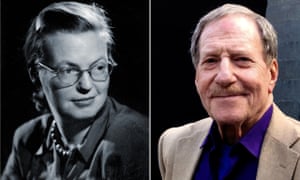‘My job was to let my mother talk’: Shirley Jackson’s son on a book of her letters
In a revealing new book, the under-appreciated author’s son shows a new side to his misunderstood mother

It has taken a while for the world to catch up to the disturbing works of Shirley Jackson. Although she caused a furor with her 1948 story The Lottery – the “winner” gets stoned to death – the rest of her voluminous literary output went largely under-appreciated during her lifetime and for decades after that. It’s not hard to imagine that she was ahead of her time – or at least ahead of what society wanted a woman to be writing about in the middle of the 20th century. Jackson herself ruefully noted that many expected The Lottery to end with the awarding of a washing machine, and her other subjects – including the end of the world and a woman experiencing dissociative identity disorder – weren’t exactly the stuff of the feminine mystique.
Befitting a world now full of post-apocalyptic narratives – many of the best written by women, and others in news headlines – Jackson’s work has recently become ascendant. She received official recognition of sorts with a prestigious Library of America edition of selected works in 2010, and this was followed by the return of all of her fiction into print in the ensuing years. A high-profile biography by critic Ruth Franklin appeared in 2016, the film Shirley had Elisabeth Moss star as a semi-fictionalised version of her and Netflix adapted her 1959 horror novel into an acclaimed miniseries.
Amid all of this activity, Jackson’s eldest child, Laurence Jackson Hyman, has overseen the production of an edited volume of his mothers letters, collecting some 500 of the author’s missives that chart an arc from an innocent college “debutante” to a world-weary veteran author. Much of these letters came into Hyman’s hands decades ago in the 1970s, when his grandmother passed them down to him. “It took me weeks before I had the nerve to open the box and start reading them,” Hyman said to the Guardian. “But when I did, my childhood instantly came back to me. When I looked at the paper she’d use, the goldenrod, I started remembering things like how I’d get her letters at camp.”
From those beginnings, Hyman searched far and wide for as many of his mother’s letters as he could find. Jackson biographer Franklin supplied many, including some of the book’s liveliest and most personal: letters to Jeanne Betty, a fan of Jackson’s who was to become a treasured confidante and source of literary conversations toward the lonely end of the author’s life.
Hyman’s hopes with these letters are to let Jackson have an autobiography of sorts. “My job was just to let my mother talk,” he says. Hyman noted that his mother rarely wrote about herself, finding it very difficult to do so, but he insists that she knew that one day these letters would be in print. “This is her story,” he says, “and she was telling it one day at a time. I think that’s the real value of this book.”
If this is Jackson’s story, it may be a different one than readers have been expecting to hear. There is little of the literary gossip and and writing about writing that readers might want — to the contrary, Jackson shows a marked disinterest in discussing her work, drolly recounting to New Yorker cartoonist James Thurber how she declined to give any interpretation of The Lottery to her editors before publishing it there: “i do know that when gus called me to say that they were buying the story he asked – ‘for our own information’ – if I cared to take any stand on the meaning of the story. i could not – having concentrated only on the important fact he had mentioned, which was that they were buying the story.”
In addition, despite Jackson’s reputation as a macabre, reclusive author – Moss’s depiction of her in Shirley is of an alcoholic with a loosening grip on reality – the Letters are filled with images of her as a devoted mother and faithful daughter who takes great pleasure in the domestic. The book is littered with lengthy correspondence with “dearest mother and pop,” and much space is also taken by the ins and outs of her prolific articles for women’s magazines. She seemed to genuinely enjoy this writing and the lifestyle that produced it. “There is just so much fun and satisfaction in day-to-day life,” she chirpily enthused to her editor at Good Housekeeping while proposing a monthly column on the small delights of home and children.
Yet there was another side to Jackson the housewife. While the male writers of her era had the freedom to write for hours and hours every day, never worrying about housekeeping, Jackson scraped together time in front of her typewriter in between chores while her children were off at school. In addition, she was regularly undermined and invalidated by a world that simply took her at face value. Hyman recalls how, when checking in to the hospital in order to deliver her third child, Jackson stated her profession as “author” but the clerk instead wrote down “housewife”. Likewise, one letter shows Jackson recalling how she kept a college literature department spellbound as she read them twenty-some pages of a novel, yet the next day the very same audience would treat her with indifference: “This morning I am Mr Hyman’s wife again,” she writes with biting resentment.
Perhaps Jackson’s love of mordant remarks was a necessary coping mechanism against an unfair world. If there is one thing that Jackson deploys regularly and fantastically throughout these letters, it is the acid wit with which she finds much mirth in household catastrophes, slights and misunderstandings, and even her own bodily ailments. To one fan she writes, “for two weeks i have been indulging in a frightful and probably contagious (burn this letter) intestinal disease” (and this was a fan whom Jackson liked). This humor found its way into her literature as a device to effectively ratchet up the terror, as well as a penchant for the slapstick and the vaudevillian.
If The Letters of Shirley Jackson is to be the author’s autobiography, it is one that reminds us that writers are always far more multiple than their literary output, public personae, and heralds would imply. Jackson may have been a rare genius, but she was more fundamentally a human being, one who strove to make others happy and to find some contentment in her literary vocation. As the Jackson industry continues to rev up and transform her image into what best suits its needs, it’s important to remember the living, breathing person who gave rise to the visions that it now so richly propagates. These letters do so.
The Letters of Shirley Jackson is out now



